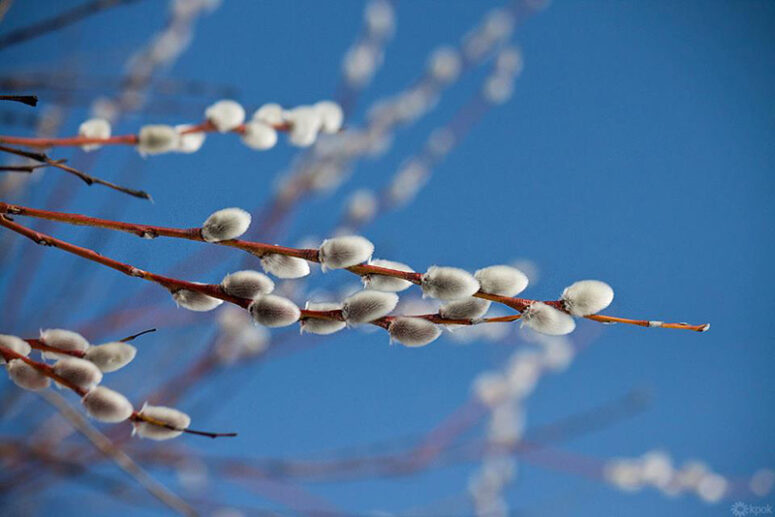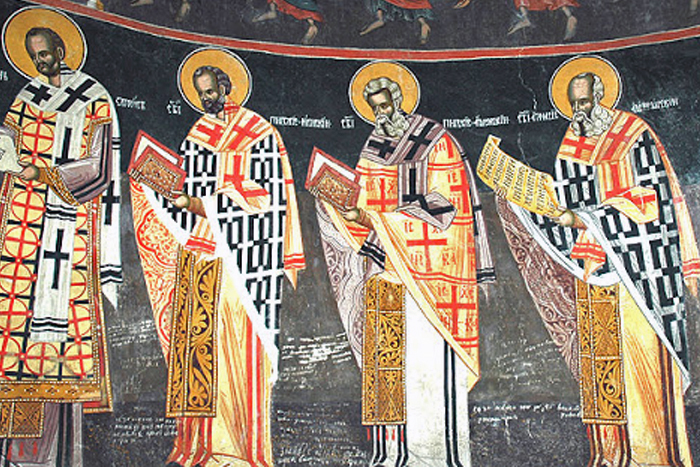
“Many people celebrate holidays and know these holidays’ names.
Often they do it without knowing the reasons why they are established” (St John Chrysostom).
A willow twig in our hands is a sign that the Lord’s Entry into Jerusalem for voluntary suffering is no less important to us than to those who greeted Him with palm branches and shouted “Hosanna!” two thousand years ago. “We too, like the children, carry the symbols of victory and cry to Thee, the Vanquisher of death: Hosanna in the Heights! Blessed is He Who comes in the Name of the Lord.” the troparion of the holiday says.
The church is timeless. Divine services hardly ever speak of sacred events in the past tense. For example, we rarely hear that “the Lord ENTERED Jerusalem”. Much more often the expression “ENTERS TODAY” is used. Evangelical events are experienced in human souls in a new way every time. We bring willows to the temple holding them during the service to show that we also welcome the Lord as our King and Messiah.
Unfortunately, over time this beautiful tradition has been reinterpreted in terms of trivial rituals. The folk tradition has reduced the meaning of the holiday shifting its emphasis (originally placed by liturgical texts on Christ “Coming in the name of the Lord” and the people greeting Him) to the consecration of the willow. It is beginning to look like we bring pussy willow to the temple (or rather, take it from the temple) as a kind of an amulet, rather than a way to testify our love to God. Sadly, we see the same story repeating year after year, when great numbers of people come to church long after the Liturgy has ended asking “Where is the willow being handed out here?”
Today we can find all sorts of advice about what to do with the willow, where to keep it and for how many years. Sometimes they even recommend eating a willow bud as a medicine. People hope to get help from the willow, because the willow is consecrated. But if we take a close look at the text of the prayer, it turns out that there is not a single word there about the willows being sanctified. Its meaning lies in the following phrase: “… O Master, keep and preserve us also, who, following their example (people coming to greet Christ with boughs of trees and palm branches, foretelling His Resurrection), on the pre-feast of that day, carry in our hands palms and branches”. It turns out that the church sees us, and not the branches as the object of consecration. The Small Euchologion (a collection of priestly prayers with sacraments and rites) contains no instruction to sprinkle the willow or any other trees with holy water. This instruction later appeared in the Service Book (a book containing orders of the Liturgy, Vespers, Matins etc.) as a reflection of the established practice.
The Prayer of the Blessing of the Palms
“Lord our God, enthroned above the Cherubim, You have stirred up Your power and sent Your only-begotten Son, our Lord Jesus Christ, to redeem the world through His Cross, His burial and His Resurrection. When He came to Jerusalem to His voluntary Passion, the people, living in darkness and the shadow of death, taking up the symbols of victory, boughs of trees and palm branches, foretold the Resurrection. Master as we too, imitating them, carry Palms and branches on this eve of the feast, watch over us. And as we offer You Hosanna, like those multitudes and the children, safeguard us, so that in hymns and spiritual songs we, too, may worthily witness the life-giving Resurrection on the third day, in Christ Jesus our Lord, with Whom You are blessed, together with Your all-holy, good and life-giving Spirit, now and always and forever and ever. Amen.
Translated by The Catalogue of Good Deeds
Source: https://sueverie.net/osvyashhenie-verby.html




